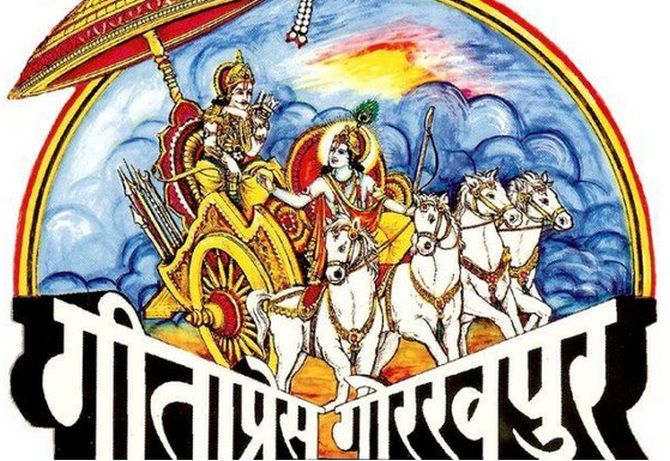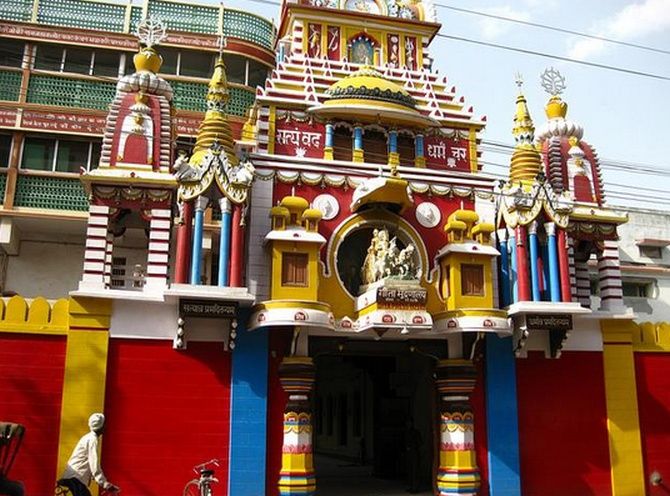Though the worker strike at the Gorakhpur-based publisher of Hindu religious texts has been called off, it hints at an underlying financial crisis, says Manavi Kapur

That talk of a financial crunch at Gita Press, the largest publisher of Hindu religious books in the world and, according to a recent book, a powerful voice of the Hindu right, should circulate when the supposedly pro-Hindu Bharatiya Janata Party is in power sounds almost ironical.
Workers at the Gorakhpur (Uttar Pradesh)-based press went on strike since August 8 to demand higher wages. This was their second major strike in less than a year.
The stand-off between the workers and the management even led the Gita Press Trust Board, which oversees the workings of the press and its other businesses, to consider shifting the press to Gujarat.
When I visit the press on Monday, the signs of unrest are all there to see. Across the entrance from Gita Press, workers sit on the steps of the three-storey Gita Press bookshop that is currently shut. Sleepy cattle at the bottom of the steps keep them company.
As my car pulls over, several workers gather around, assuming that I am there to mediate between them and the management. They stand there in what seems like defiance, not saying anything and waiting for me to speak first. The nervous energy is palpable, as is the anger.
When I inform them the purpose of my visit, their sullenness doesn't go away. I am told that their spokesperson, Virendra Bahadur Singh, has stepped out for lunch and will be back soon.
I make my way through the entrance of the press, which resembles the dome of a temple. Electricity seems to be off and so does the back-up generator. Workers crowd what looks like the lobby area -- a large iron gate inside separates this from the main press -- and guards seem to be struggling to keep them out.
The issue at hand
The union leader Singh then walks in with about ten workers behind him. "The main issue is an increment in our salaries, which the management is not agreeing to," he tells me.
The strike began after dialogue with the management over wages failed. The press has 220 permanent and 250 contractual workers, though Singh insists that the number of contractual workers is higher (about 337). Singh adds that none of the contractual workers, despite having worked at the press for over 20 years, has any employment papers or attendance records.
These workers are paid according to three monthly salary slabs: Rs 5,750, Rs 6,325 and Rs 7,085. Additionally, they get a dearness allowance. The press has been giving them an increment of Rs 10, Rs 15 and Rs 20, respectively, for the last 40 years, going by the workers' account.
According to Singh, workers were in talks with Baijnath Agarwal, a trustee of the Gita Press Trust Board, to give them an increment of Rs 600, Rs 750 and Rs 900 for the three slabs, respectively, but there was a deadlock.
This is when Megh Singh Chauhan, assistant manager at the press, was called in to mediate. Chauhan promised the workers, by their own account, that all their increment demands will be met unconditionally by August 7, or he would leave the press.
"On August 7, Chauhan told us that the demands will only be met when all court cases against the press are withdrawn," Singh says. This led them to force Chauhan to quit the press.
The management claims that the workers assaulted Chauhan and, as a result, suspended 12 permanent workers and terminated five contractual workers. "They claim that we misbehaved with him but they have no proof. Why don't they show us proof of this assault on the CCTV footage?" asks Singh.
Just then, a loud fight breaks out between one of the guards and a few protesting workers. They want to know why the gate was installed inside the press to create the lobby. "This gate was only installed last week. Before that, we could at least sit inside and access washrooms and drinking water," says a worker who calls himself Yadav. A guard informs me that I have been summoned inside.

Calm before the storm
The quiet inside the premises of Gita Press heightens the voices of disquiet outside. A long corridor, with rooms on either side, leads into the press. The exteriors are painted a dull yellow and Sanskrit shlokas are inscribed on all facades in maroon paint.
Lal Mani Tripathi, production manager, is unfazed by the power cut in his office and the ensuing humidity. He is deep in conversation on his mobile phone about kidney stones, premature babies and jaundice, seated behind a neat desk in his cubicle inside a freshly-tiled office.
Copies ofKalyan, Gita Press's bestselling monthly magazine, can be found almost on all desks. He tells me that Ishwar Prasad Patwari, the trustee who does all media interaction, will brief me.
A peon escorts me to Patwari's office, which seems to be a fortress in itself. Another peon, on the other side of an iron gate, opens the lock to let me in. I walk through Gita Press's cloth shop, one of its businesses whose profits aid the running of the highly subsidised press. I remove my shoes before walking into Patwari's office.
Seated behind a majestic desk and peering into a screen that shows the entire premises' CCTV footage, Patwari wears the air of a man in power. Dressed in a white kurta-pyjama and with sandalwood paste on his forehead, his chair is covered with a towel, much like bureaucrats and ministers.
"There is no financial crisis at Gita Press," he says without preamble. He then leafs through a folder and hands me a press release in English. The sixth item on the press release mentions, in capital letters, that the press accepts no donations, "either in cash or in kind".
This seems to be an outcome of a WhatsApp message that was circulated after the press shut down due to the strike. "The account details of Kalyan are available online for subscription purposes and funds suddenly started pouring in," explains Patwari. This bank account had to be then frozen. A similar appeal features on the website of Gita Press.
When I ask him about the labour strike, he offers me a benign smile. "This is a temporary problem, like in any other organisation. But one thing is clear: we will not accept any sort of indiscipline from our workers."
In terms of wages, he says, Gita Press pays 60 to 70 per cent of its workers more than what is stipulated by the government. "In any case, it is not less than what is the minimum wage according to government regulations," he says.
That talk of a financial crunch at Gita Press, the largest publisher of Hindu religious books in the world and, according to a recent book, a powerful voice of the Hindu right, should circulate when the supposedly pro-Hindu Bharatiya Janata Party is in power sounds almost ironical.
Workers at the Gorakhpur (Uttar Pradesh)-based press went on strike since August 8 to demand higher wages. This was their second major strike in less than a year. The stand-off between the workers and the management even led the Gita Press Trust Board, which oversees the workings of the press and its other businesses, to consider shifting the press to Gujarat.
When I visit the press on Monday, the signs of unrest are all there to see. Across the entrance from Gita Press, workers sit on the steps of the three-storey Gita Press bookshop that is currently shut. Sleepy cattle at the bottom of the steps keep them company.
As my car pulls over, several workers gather around, assuming that I am there to mediate between them and the management. They stand there in what seems like defiance, not saying anything and waiting for me to speak first. The nervous energy is palpable, as is the anger.
When I inform them the purpose of my visit, their sullenness doesn't go away. I am told that their spokesperson, Virendra Bahadur Singh, has stepped out for lunch and will be back soon.
I make my way through the entrance of the press, which resembles the dome of a temple. Electricity seems to be off and so does the back-up generator. Workers crowd what looks like the lobby area - a large iron gate inside separates this from the main press - and guards seem to be struggling to keep them out.
Maneuvering the crisis
He also denies that the gate inside the premises was installed due to the strike. "That was ordered much before the strike began. It is mere coincidence." Jittery workers, though, seem to see a strong message from the management in this.
Through its modern press -- it upgraded its machine just a year ago -- Gita Press publishes books worth Rs 15 lakh every day. "You can say that's the average cost of running the press, since we sell most of it at cost," Patwari explains.
Whatever losses it makes are supplemented by the Gita Press Hast Nirmit Vastra Vibhag, or the handloom division, and the Rishikesh-based Gita Bhawan Ayurved Sansthan. The handloom division, though, now only retails commercially-produced cloth that it sources from all over the country.
Radheyshyam Khemka, the editor of Kalyan, concurs that the press is financially stable because of the Ayurveda and cloth businesses.
"This labour strike has brought unnecessary focus onto our finances. We are a religious organisation and not profit-oriented to begin with," he says over the phone from Varanasi, where he heads a team of about 20 editorial staff. According to him, the threat of moving out of Gujarat was an "ultimatum" of sorts, "to send out a message that indiscipline will not be tolerated".
Both the installation of the gate and the threat of moving out of Gorakhpur seem to have worked, it seems. The strike was called off the day after my visit, without meeting the workers' demand for increments or revocation of the suspension and termination of 17 workers.
The debate over increment has been left contingent on their "good behaviour", says Khemka.
Whether the workers get their way with the management is yet to be seen. But Patwari's appeal to the subscribers of Gita Press seems to have worked, for now. "All brothers and sisters are hereby requested to propagate this message… so that the entire countrymen who got into the state of shock and melancholic should get respite and feel happy to know the real state of affairs. (sic)"







 © 2025
© 2025